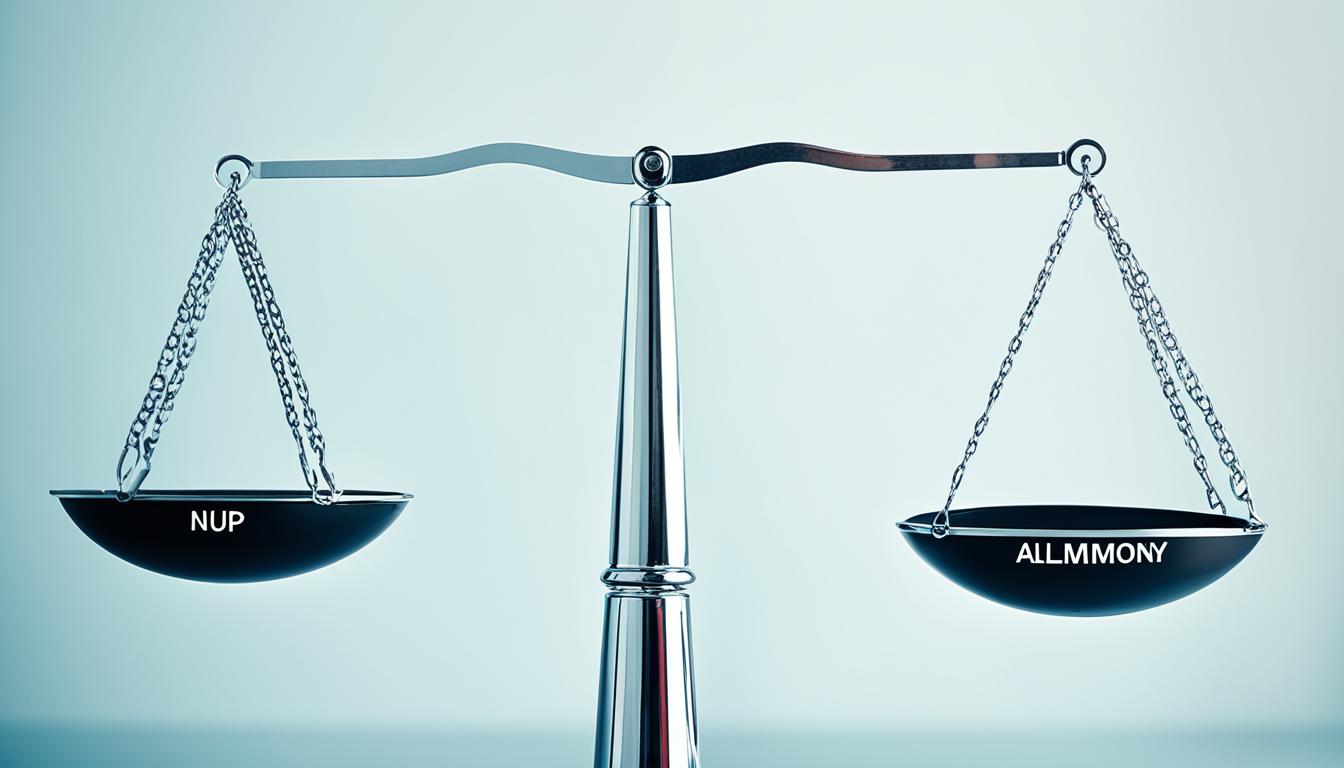The duration of a marriage plays a crucial role in determining eligibility for alimony. Did you know that the requirements for spousal support may vary following a 5-year marriage? In some states, being married for at least 5 years is a basic requirement for the court to even consider awarding alimony. On the other hand, the length of the marriage can have different implications in other jurisdictions. Understanding the nuances of alimony eligibility based on the duration of the marriage is essential for individuals going through a divorce. Check out this link for more information on alimony eligibility: alimony eligibility.
Key Takeaways:
- Alimony, also known as spousal support, is a court-ordered payment from one spouse to their ex-spouse.
- In Ohio, a marriage of at least 5 years is generally required for the court to consider awarding spousal support.
- Factors such as income, earning ability, age, physical condition, and retirement benefits are also considered when determining spousal support.
- The duration of spousal support can vary based on the length of the marriage, with shorter marriages typically resulting in shorter support periods.
- Consulting with a divorce lawyer specializing in family law is crucial to understanding the specific spousal support laws in your state.
Factors Considered in Spousal Support Calculations
When calculating spousal support in Ohio, several factors come into play. These factors are essential in determining the amount and duration of alimony payments. While the specifics of spousal support calculations may vary by county, there are key elements that the court typically considers.
Income and Earning Ability
One crucial factor in spousal support calculations is each person’s income and earning ability. The court examines the income levels of both parties, including any significant disparities. This assessment helps determine if one spouse requires financial assistance to maintain a reasonable standard of living.
Age and Physical Condition
The age and physical condition of each spouse are also important factors. The court takes into account factors such as overall health, disabilities, and the impact they may have on employability and future earning potential. Older spouses or those with health limitations may be more likely to receive spousal support.
Retirement Benefits
The court considers retirement benefits when calculating spousal support. These benefits include pensions, retirement accounts, and Social Security. The court examines the accrued benefits to ensure equitable distribution and determine their impact on each spouse’s financial standing.
Education Level
Education level plays a role in spousal support calculations as well. The court considers the educational background of each spouse, including degrees or professional certifications. This factor helps assess earning potential and the ability to secure gainful employment.
Standard of Living During the Marriage
The lifestyle enjoyed during the marriage also influences spousal support. The court examines the standard of living established during the marital union, taking into account factors such as housing, transportation, and recreational activities. The goal is to ensure that both parties can maintain a similar standard of living after the divorce.
Assets and Liabilities
The court takes into account the relative assets and liabilities of each spouse. This includes property, investments, debts, and financial obligations. Evaluating these factors helps determine the financial resources available to each party and their ability to support themselves.
These factors, among others, guide the court in making fair and equitable spousal support calculations. It is important to consult with a skilled divorce attorney who specializes in family law to navigate the complexities of spousal support in Ohio.
Duration of Spousal Support
The duration of spousal support depends on the length of the marriage. Generally, a court will not consider awarding spousal support unless the marriage has lasted at least five years. For marriages of 20 years or more, the court may consider awarding indefinite spousal support. In cases where indefinite support is not awarded, the general rule of thumb is for spousal support to be awarded for one-third of the length of the marriage. The court may retain jurisdiction over spousal support, allowing for modifications in the future based on significant changes in income or the remarriage or cohabitation of the recipient.

Note: The image above depicts a scale representing the duration of spousal support in relation to the length of marriage.
Temporary vs. Permanent Spousal Support Orders
During the divorce process, temporary spousal support may be ordered to ensure financial stability for both parties. Temporary support serves as a temporary solution until a final support order is determined. It is important to note that the amount of temporary support may differ from the final support order.
On the other hand, permanent spousal support does not necessarily mean lifelong support. It refers to the final support order issued upon the completion of the divorce. Permanent support can be modified later if circumstances warrant it, such as significant changes in income or the cohabitation of the recipient. It is important to understand that spousal support may also terminate upon the death of either party or if the recipient remarries.
Temporary and Permanent Spousal Support Comparison:
| Aspect | Temporary Spousal Support | Permanent Spousal Support |
|---|---|---|
| Definition | Short-term financial assistance during divorce proceedings | Final support order issued upon divorce completion |
| Modifiability | Subject to change before the final support order | Modifiable later based on significant changes in circumstances |
| Termination | Ends upon final support order or completion of divorce | May terminate upon the death of either party or recipient’s remarriage |
Understanding the distinctions between temporary and permanent spousal support is crucial in navigating the complexities of Ohio spousal support law. It is advisable to consult with a knowledgeable divorce attorney who specializes in family law to ensure your rights are protected and you achieve a fair and favorable resolution.

Understanding Spousal Support in Divorce Proceedings
Many individuals have questions and concerns about spousal support in divorce proceedings. It’s natural to feel concerned about financial stability post-divorce and the impact on assets. That’s why it’s crucial to schedule a consultation with a divorce lawyer specializing in family law.
An experienced attorney can provide guidance and help you understand the specific spousal support laws and regulations in your area. While there is no exact online calculator for spousal support, an attorney can assess your unique situation and consider various aspects, such as the length of the marriage, income levels, education, and past case rulings.
Going through a divorce can be overwhelming, and having a trustworthy legal professional by your side can alleviate some of the stress. A divorce lawyer with expertise in family law can guide you through the entire process, from explaining the intricacies of spousal support to representing your best interests in court.
If you have concerns or questions about spousal support in your divorce, it’s essential to seek divorce lawyer consultation to fully understand your rights and options.
| Benefits of a Divorce Lawyer Consultation | How a Divorce Lawyer Can Help |
|---|---|
|
|
By consulting with a divorce lawyer, you can gain a clearer understanding of your rights and options regarding spousal support. Remember, each divorce case is unique, and it’s crucial to have professional guidance tailored to your specific circumstances.

Spousal Support Laws in Different States
Spousal support, also known as alimony, is a significant aspect of divorce proceedings. However, it’s important to note that spousal support laws can vary from state to state, making it essential to understand the regulations specific to your jurisdiction. Each state has its own set of factors that determine eligibility and the duration of spousal support.
For instance, some states like Florida, Oregon, and New Jersey, still permit the permanent payment of alimony. In these states, spousal support can be awarded indefinitely. On the other hand, other states grant temporary or rehabilitative alimony, which is designed to provide financial assistance for a specific period or until the recipient gains sufficient self-support.
The factors considered in determining eligibility and duration of spousal support generally include the length of the marriage, the financial needs of the recipient, the standard of living during the marriage, and the respective earning capacities of the parties involved.
Consulting with a knowledgeable attorney based in the state where your divorce is taking place is crucial for understanding the specific spousal support laws that apply in your situation. They can provide expert guidance, ensuring that you are aware of the regulations governing alimony in your state and how they might impact your case.

State-Specific Spousal Support Regulations
Here are a few examples of how spousal support laws vary across different states:
| State | Alimony Laws | Spousal Support Duration |
|---|---|---|
| Texas | Typically requires at least 10 years of marriage for spousal support | Varies depending on the circumstances of the case |
| California | Allows for alimony payments for a duration equal to half the length of the marriage for marriages less than 10 years | Varies depending on the length of the marriage |
| New York | Has different spousal support durations based on the length of the marriage, ranging from approximately five years to ten years | Varies depending on the length of the marriage |
| Florida | Considers the duration of the marriage in determining the likelihood of spousal support eligibility | Varies depending on the circumstances of the case |
These examples showcase the diversity of spousal support laws across different states and emphasize the importance of understanding the specific regulations that apply in your jurisdiction.
Note: The above information serves as a general guide and may not reflect the most recent changes in individual state laws. It is always advisable to consult with a qualified attorney for the most up-to-date information regarding spousal support in your state.
The Impact of Marriage Length on Alimony Eligibility
The duration of the marriage plays a significant role in determining eligibility for spousal support, also known as alimony. Different states have varying requirements regarding the minimum marriage length for a party to be eligible for alimony.
In Texas, for instance, a minimum of 10 years of marriage is typically required for spousal support to be granted. California, on the other hand, allows for alimony payments for a period equal to half the length of the marriage for marriages that lasted less than 10 years. In New York, alimony durations range from approximately five years to ten years, depending on the length of the marriage. Florida takes the duration of the marriage into account when determining the likelihood of spousal support eligibility.
| State | Minimum Marriage Length for Alimony Eligibility |
|---|---|
| Texas | 10 years |
| California | Half the length of the marriage for marriages less than 10 years |
| New York | Durations vary from approximately 5 years to 10 years |
| Florida | Duration of the marriage is considered for eligibility |
Understanding the specific requirements in your state is essential when it comes to navigating spousal support in divorce proceedings. Consulting with a knowledgeable divorce lawyer specializing in family law will provide the guidance you need to navigate the complexities and ensure fair outcomes.
Working with a Divorce Lawyer to Navigate Alimony Disputes
When dealing with spousal support disputes, it’s crucial to work with a qualified divorce lawyer who can protect your rights and ensure a fair resolution. They can help navigate the complex legal and financial factors involved in spousal support negotiations.
Whether you are seeking to maximize or minimize spousal support, an experienced attorney will provide guidance based on your specific circumstances, including income levels, assets, and the length of the marriage. A divorce lawyer will be your advocate and help you understand the available options while ensuring your best interests are represented.
Divorce lawyers specialize in family law and have the expertise to handle alimony negotiation effectively. Their knowledge of the legal and financial factors in spousal support ensures that all aspects of your case are considered, including income disparities, financial obligations, and any unique circumstances that may impact the determination of spousal support.
By working with a divorce lawyer, you can navigate the complexities of alimony disputes with confidence, knowing that you have a skilled professional guiding you through the process. They will fight for your rights and work towards a fair resolution that protects your financial well-being in the long run.
Why Hire a Divorce Lawyer?
“A divorce lawyer specializing in family law is an invaluable asset when it comes to navigating the intricacies of spousal support. They bring their expertise and experience to the table, ensuring that you receive proper representation and that your interests are protected. From negotiating fair alimony terms to advocating for your financial stability, a divorce lawyer will provide the guidance and support you need during this challenging time.”
Working closely with a divorce lawyer ensures that you have an advocate who understands the complexities of alimony negotiations. They will assess the strength of your case, help you gather the necessary documentation, and develop a strategy tailored to your specific circumstances. With their legal expertise, you can confidently navigate the legal process and seek a favorable outcome.

Legal and Financial Factors in Spousal Support
Divorce lawyers consider various legal and financial factors when representing you in spousal support negotiations. These factors can include:
- The length of the marriage
- The earning capacity of each spouse
- Income and financial resources
- Contributions to the marriage
- Standard of living during the marriage
- Child custody and support obligations
- Retirement benefits
- Debts and liabilities
By thoroughly examining and analyzing these factors, a divorce lawyer will build a strong case on your behalf, ensuring that all relevant legal and financial considerations are taken into account.
When it comes to alimony negotiation, having a skilled divorce lawyer by your side is crucial. They will represent your interests, advocate for a fair and reasonable resolution, and work towards securing the best possible outcome for your spousal support case.
Conclusion
In conclusion, when it comes to spousal support in divorce proceedings, understanding the eligibility requirements, factors considered in calculations, duration of support, and state-specific laws is crucial. Each case is unique, and the specific details can vary depending on your state of residence. Therefore, it is essential to consult with a divorce lawyer specializing in family law who can provide you with the necessary guidance and support to navigate the complexities of spousal support.
By working with an experienced attorney and understanding the relevant factors, you can ensure a fair resolution and protect your rights throughout the divorce process. They will help you navigate the legal and financial aspects of spousal support negotiations, taking into account factors such as income levels, assets, and the length of the marriage. With their expertise, you can confidently approach spousal support disputes and strive for a favorable outcome.
Remember, the journey of spousal support can be challenging, but with the right legal representation and knowledge, you can navigate it successfully. Consulting with a divorce lawyer who specializes in family law will provide you with comprehensive information and support to make informed decisions about your spousal support case.
FAQ
What is alimony?
Alimony, also known as spousal support, is a court-ordered payment made by one spouse to their ex-spouse.
How is spousal support calculated in Ohio?
Spousal support in Ohio is calculated based on factors such as income, earning ability, age, physical condition, retirement benefits, and the duration of the marriage.
How long does spousal support last in Ohio?
The duration of spousal support in Ohio depends on the length of the marriage, with shorter marriages resulting in shorter support periods. Generally, a marriage of at least five years is required for the court to consider awarding spousal support.
What is the difference between temporary and permanent spousal support?
Temporary spousal support is ordered during divorce proceedings to ensure financial stability, while permanent spousal support refers to the final support order issued upon divorce completion.
How do spousal support laws vary from state to state?
Spousal support laws vary by state, with some allowing for permanent alimony payments and others granting temporary or rehabilitative alimony. Each state has specific factors that determine eligibility and duration of spousal support, such as the length of the marriage and the financial needs of the recipient.
How does the length of the marriage impact spousal support eligibility?
The length of the marriage is a significant factor in determining spousal support eligibility. Some states require a minimum marriage length before alimony can be granted.
Why is it important to work with a divorce lawyer when dealing with spousal support disputes?
A divorce lawyer can protect your rights, navigate the complexities of spousal support negotiations, and ensure a fair resolution based on your specific circumstances.
Where can I find more information about spousal support in divorce proceedings?
To understand the specific spousal support laws in your area and receive guidance tailored to your situation, it’s important to consult with a divorce lawyer specializing in family law.
What should I know about spousal support before getting a divorce?
Understanding the eligibility requirements, factors considered in spousal support calculations, duration of support, and state-specific laws is essential when navigating spousal support in divorce proceedings. Consult with a divorce lawyer to ensure a fair resolution and protect your rights throughout the process.










